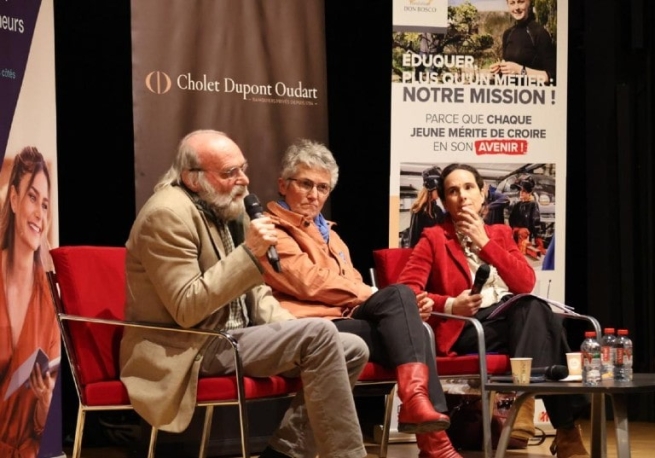The event, moderated by Clémence Houdaille, journalist for the French Catholic daily La Croix, drew 300 attendees.
Marie-Aleth Grard, president of ATD-Quart Monde since 2020, emphasized her movement’s 60-year fight for a society where no one is left behind:
“Extreme poverty affects housing, employment, health, culture... but especially education. These are people without a voice—people who are invisible, yet yearn for a place in society.”
She reaffirmed one of ATD’s core beliefs: “Any policy based on the needs of the poorest will benefit everyone. Any policy that ignores them will exclude them.”
Fr. Jean-Marie Petitclerc, in his role as coordinator of “Don Bosco Action Sociale,” began by referencing the intuition of Salesian founder St. John Bosco:
“The ability to educate does not depend so much on the institutional setup, but on the quality of the relationship between the adult and the young person.”
This is something educators grounded in Salesian pedagogy experience daily—a pedagogy based on trust, hope, and partnership.
But the challenge is immense, Grard pointed out:
“What can teachers do when families are moving from one hostel room to another? Their daily lives are completely different. It’s hard to imagine just how difficult it is to truly understand extreme poverty.”
One thing is clear, however: families in poverty have great expectations of the school system—even if they sometimes struggle to express them.
“You can’t imagine how much of a blow extreme poverty is to one’s self-esteem. And yet, when we talk to these struggling parents—those living in public housing, in shantytowns, or moving from hotel to hotel—they tell us: ‘School will give my child a better life.’”
“At Don Bosco, we know well that school failure is not primarily about intelligence,” Fr. Petitclerc added.
“It’s about lack of focus. Precarious living conditions (in France, 2,000 children live on the streets!) create such insecurity that children arrive at school burdened with too many worries. True academic success isn’t about having a head full of facts—it’s about being clear-headed enough to learn every morning.”
He also highlighted another key principle of Salesian pedagogy: celebrating success.
“The goal is to help young people discover the joy of achievement,” he said, using the example of a Physical Education teacher who starts a high jump lesson at 80 cm and then gradually raises the bar—never the reverse.
To rebuild trust, Grard said, “we also need the courage to take our time. If we want to understand each other, to truly listen, we need time.”
Fr. Petitclerc, citing research by François Le Clère, former Director General of the Salesian association Valdocco, noted:
“When a young person drops out of school, the first few days feel like a vacation—liberating, even enjoyable. That’s when institutions step back in—but the student isn’t ready. Later, when they begin to feel bored and want to re-engage, it’s the institution that’s moved on and lost motivation.”
Benoit Deseure
Source: Don Bosco Aujourd’hui


